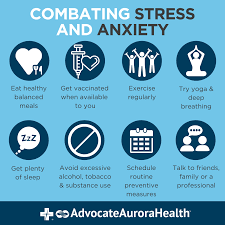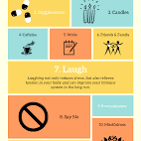Dealing with Stress and Anxiety
Stress and anxiety are common experiences that many people face in their daily lives. Whether it’s due to work pressures, personal relationships, or other factors, managing stress and anxiety is essential for overall well-being. Here are some effective strategies to help you cope with these challenges:
Practice Mindfulness
Mindfulness involves being fully present in the moment and paying attention to your thoughts and feelings without judgment. By practicing mindfulness through activities like meditation or deep breathing exercises, you can reduce stress and promote a sense of calmness.
Stay Active
Exercise is a powerful tool for combating stress and anxiety. Physical activity releases endorphins, which are chemicals in the brain that act as natural painkillers and mood elevators. Whether it’s going for a walk, practicing yoga, or hitting the gym, staying active can help alleviate stress and improve your overall mental health.
Maintain a Healthy Lifestyle
Eating a balanced diet, getting enough sleep, and avoiding excessive caffeine and alcohol consumption are important factors in managing stress and anxiety. A healthy lifestyle supports your body’s ability to cope with challenges more effectively.
Seek Support
Don’t hesitate to reach out to friends, family members, or mental health professionals for support when you’re feeling overwhelmed by stress and anxiety. Talking about your feelings can provide relief and perspective on how to address the root causes of your distress.
Practice Relaxation Techniques
Incorporate relaxation techniques such as progressive muscle relaxation, guided imagery, or aromatherapy into your daily routine to help calm your mind and body when feeling stressed or anxious.
Remember that it’s normal to experience stress and anxiety at times, but taking proactive steps to manage these feelings can lead to improved mental well-being. By incorporating these strategies into your life, you can build resilience and better cope with life’s challenges.
“Recognizing Stress: 5 Emotional Indicators You Shouldn’t Ignore”
3. “Building Resilience: Top 5 Cop
- What is the 3 3 3 rule for anxiety?
- What are 5 emotional signs of stress?
- What are 5 coping skills for anxiety?
- How can I calm my stress and anxiety?
What is the 3 3 3 rule for anxiety?
The 3 3 3 rule for anxiety is a simple and effective technique that can help individuals manage their anxious thoughts and feelings. The rule involves acknowledging three things you can see, three things you can hear, and then moving three parts of your body. By focusing on these sensory experiences in the present moment, the 3 3 3 rule can help shift your attention away from anxious thoughts and bring you back to the here and now. This grounding exercise is a quick way to calm the mind and reduce feelings of anxiety by engaging with your immediate surroundings.
What are 5 emotional signs of stress?
When it comes to dealing with stress and anxiety, it’s important to recognize the emotional signs that may indicate you are under significant pressure. Five common emotional signs of stress include increased irritability or agitation, feelings of overwhelm or being easily frustrated, persistent worry or anxiety, mood swings or heightened emotional reactions, and a sense of helplessness or lack of control over your circumstances. By being aware of these emotional indicators, you can take proactive steps to manage your stress levels and prioritize your mental well-being. Remember that seeking support and implementing healthy coping strategies can make a significant difference in how you navigate challenging situations.
What are 5 coping skills for anxiety?
When it comes to managing anxiety, having effective coping skills is crucial. Five strategies that can help individuals cope with anxiety include deep breathing exercises, practicing mindfulness and meditation, engaging in regular physical activity, maintaining a healthy lifestyle through proper nutrition and adequate sleep, and seeking support from friends, family, or mental health professionals. These coping skills can provide individuals with practical tools to navigate anxious feelings and promote a sense of calmness and well-being in their daily lives.
How can I calm my stress and anxiety?
To calm stress and anxiety, it’s important to practice self-care techniques that promote relaxation and emotional well-being. Engaging in activities such as deep breathing exercises, mindfulness meditation, or gentle yoga can help soothe your mind and body. Setting aside time for yourself to unwind, whether through reading a book, taking a warm bath, or going for a nature walk, can also be beneficial in reducing stress levels. Additionally, maintaining a healthy lifestyle by getting regular exercise, eating nutritious foods, and prioritizing quality sleep can support your overall mental health. Seeking support from loved ones or a professional counselor can provide valuable guidance and coping strategies for managing stress and anxiety effectively. Remember that taking small steps each day to care for yourself can make a significant difference in calming your mind and finding inner peace amidst life’s challenges.




